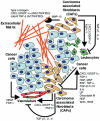The fibroblastic coconspirator in cancer progression
- PMID: 16869775
- PMCID: PMC2580828
- DOI: 10.1101/sqb.2005.70.007
The fibroblastic coconspirator in cancer progression
Abstract
A remarkable change has occurred in the thinking about epithelial-derived cancer in recent years: From almost entirely focusing on oncogenes and tumor suppressor genes has come the realization that the tumor microenvironment is a coconspirator in the carcinogenic process. Many types of stromal cells, including fibroblasts, adipocytes, macrophages, mast cells, and cells of the vascular system, are crucial contributors to epithelial carcinogenesis. Here, we focus on the fibroblast's role in cancer progression and the molecules involved in the communications between the fibroblasts and the cancer cells, including fibroblast secreted protein 1 (FSP-1 or S100A4), transforming growth factor beta (TGF-beta), the chemokine CXCL-12 (stromal derived factor 1 alpha, SDF-1alpha), type I collagen, and matrix metalloproteinase 13 (MMP-13).
Figures

Similar articles
-
Coevolution of cancer and stromal cellular responses.Cancer Cell. 2005 Jun;7(6):499-500. doi: 10.1016/j.ccr.2005.05.019. Cancer Cell. 2005. PMID: 15950897
-
Local balance of transforming growth factor-beta1 secreted from cholangiocarcinoma cells and stromal-derived factor-1 secreted from stromal fibroblasts is a factor involved in invasion of cholangiocarcinoma.Pathol Int. 2006 Jul;56(7):381-9. doi: 10.1111/j.1440-1827.2006.01982.x. Pathol Int. 2006. PMID: 16792547
-
Stromal cell-derived factor-1alpha promotes melanoma cell invasion across basement membranes involving stimulation of membrane-type 1 matrix metalloproteinase and Rho GTPase activities.Cancer Res. 2004 Apr 1;64(7):2534-43. doi: 10.1158/0008-5472.can-03-3398. Cancer Res. 2004. PMID: 15059909
-
Stromal fibroblasts in cancer: a novel tumor-promoting cell type.Cell Cycle. 2006 Aug;5(15):1597-601. doi: 10.4161/cc.5.15.3112. Epub 2006 Aug 1. Cell Cycle. 2006. PMID: 16880743 Review.
-
S100A4 (Mts1): is there any relation to the pathogenesis of rheumatoid arthritis?Autoimmun Rev. 2006 Feb;5(2):129-31. doi: 10.1016/j.autrev.2005.09.010. Epub 2005 Oct 3. Autoimmun Rev. 2006. PMID: 16431343 Review.
Cited by
-
In Silico cancer cell versus stroma cellularity index computed from species-specific human and mouse transcriptome of xenograft models: towards accurate stroma targeting therapy assessment.BMC Med Genomics. 2014;7 Suppl 1(Suppl 1):S2. doi: 10.1186/1755-8794-7-S1-S2. Epub 2014 May 8. BMC Med Genomics. 2014. PMID: 25079962 Free PMC article.
-
Palladin promotes invasion of pancreatic cancer cells by enhancing invadopodia formation in cancer-associated fibroblasts.Oncogene. 2014 Mar 6;33(10):1265-73. doi: 10.1038/onc.2013.68. Epub 2013 Mar 25. Oncogene. 2014. PMID: 23524582 Free PMC article.
-
Cancer-associated fibroblasts from lung tumors maintain their immunosuppressive abilities after high-dose irradiation.Front Oncol. 2015 May 12;5:87. doi: 10.3389/fonc.2015.00087. eCollection 2015. Front Oncol. 2015. PMID: 26029659 Free PMC article.
-
High-dose Irradiation Stimulated Breast Tumor Microenvironment to Enhance Tumor Cell Growth and Decrease Tumor Cell Motility.J Biomed Phys Eng. 2023 Jun 1;13(3):209-216. doi: 10.31661/jbpe.v0i0.2008-1167. eCollection 2023 Jun. J Biomed Phys Eng. 2023. PMID: 37312890 Free PMC article.
-
Mesenchymal stem cells in mammary adipose tissue stimulate progression of breast cancer resembling the basal-type.Cancer Biol Ther. 2012 Jul;13(9):782-92. doi: 10.4161/cbt.20561. Epub 2012 Jun 6. Cancer Biol Ther. 2012. PMID: 22669576 Free PMC article.
References
-
- Akiri G, Sabo E, Dafni H, Vadasz Z, Kartvelishvily Y, Gan N, Kessler O, Cohen T, Resnick M, Neeman M, Neufeld G. Lysyl oxidase-related protein-1 promotes tumor fibrosis and tumor progression in vivo. Cancer Res. 2003;63:1657. - PubMed
-
- Ambartsumian NS, Grigorian MS, Larsen IF, Karlstrom O, Sidenius N, Rygaard J, Georgiev G, Lukanidin E. Metastasis of mammary carcinomas in GRS/A hybrid mice transgenic for the mts1 gene. Oncogene. 1996;13:1621. - PubMed
-
- Barcellos-Hoff MH, Ravani SA. Irradiated mammary gland stroma promotes the expression of tumorigenic potential by unirradiated epithelial cells. Cancer Res. 2000;60:1254. - PubMed
Publication types
MeSH terms
Substances
Grants and funding
LinkOut - more resources
Full Text Sources
Research Materials
